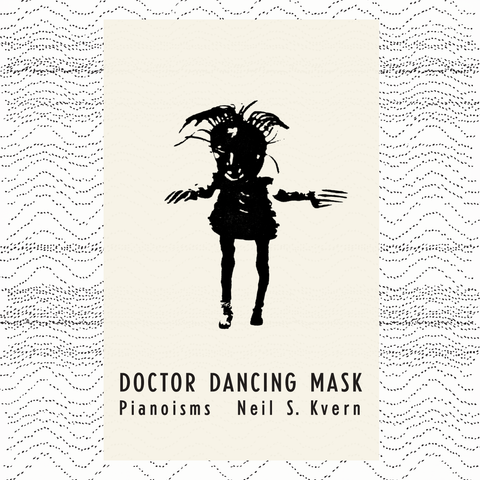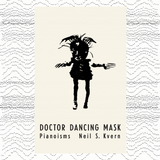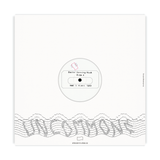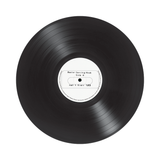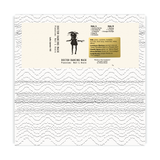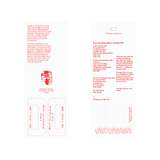
Limited edition of 555 LPs, hand assembled with love. First ever vinyl pressing.
"Neil S. Kvern’s Doctor Dancing Mask: Pianoisms is a near mythical marker on the map of late 20th century experimentalism transpiring in America’s Pacific Northwest. A sublime, spacious effort of left field DIY minimalism constructed from recurring piano pieces, hypnotic percussion, and a peppering of diverse instrumentation, vocals, and invisible effects, Doctor Dancing Mask illuminates a hidden but remarkable legacy of a young composer at the height of his creativity and consciousness.
Born in 1958 and raised in Northern Idaho, Kvern moved to Seattle in 1979 following a stint at Whitman College in Washington State. It was during this period that he met Eugene, Oregon-based musicians Carl Juarez and Brian Magill, who introduced him to a vibrant community of artists and inspired him to make music of his own. Kvern’s oeuvre of compositions – loosely inspired by minimalists like Terry Riley, Pauline Oliveros, and Philip Glass – that would emerge on a small handful self-released cassettes between 1983 and 1987 represent a largely unrecognized node of West Coast experimentalism during this period and establish important links between the Eugene Electronic Music Collective (EEMC) and Soundwork, a public-access electronic music studio and performance space in Seattle.
Self-taught, working independently and within a close network of friends and family, Kvern emphasized spontaneity in his music, constructing pieces from layered, improvisational overdubs, and drawing from a palette of piano, recorders, guitars, saxophones, marimba, and nearly any other instrument he could get his hands on. Poignantly, he recognized the distinct possibilities respectively activated by live and recorded music, and elected to exclusively realize his work in the latter format. Kvern’s recordings represent the music as it was intended to be encountered, with the multi-tracking process consciously approached as a means to rework and reimagine pieces as they evolved toward their final form; notes on magnetic tape, applied in much the same way as another composer might place a pen to the page.
Following a debut cassette, issued earlier in 1983, the twenty five year old Kvern set to work on an ambitious follow up; what would become the sixty plus minute Doctor Dancing Mask. Mostly recorded on a Tascam 244 Portastudio 4-track, using piano and various acoustic instruments (notably, tenor recorder and percussion), he was intermittently joined by his brothers Olav and Craig Kvern, Charlie Spear on guitar, Constance Maytum on vocals, and Glenn McNutt on percussion. Over a handful of months, the rotating ensemble cultivated an entirely distinct form of minimalism, blossoming with touchstones in diverse cultural traditions - African percussion, marimba, gamelan, and various folk idioms - and improvised jazz, that dances amongst the traces of effects processing and experimental approaches toward his instruments and the systems of recording alike.
Built around a series of circular piano lines and deconstructed melodies, and carried by arching percussive drive, Doctor Dancing Mask represents a fascinating juncture of creative streams, folded into a singular, shadowy statement. Blending the tangible directness, immediacy, and textures of DIY recording with a clear consideration of minimalist / post-minimalist strategies and avant-garde techniques, the album engages an active broadening of the known context 1980s West Coast minimalist experimentalism that included artists like Harold Budd, Ingram Marshall, Marc Barreca, and K. Leimer, while resting with equal ease amongst an expansive constellation of maverick, international composers that began to emerge during this period, including Giovanni Venosta, Priscilla Ermel, Morgan Fisher, and Dominique Lawalrée.
Kvern recalls the recording of Doctor Dancing Mask as a deeply intimate and responsive process: “I just listened to the instrument, tried to hear what it wanted to do. Being present to the sound, rather than bending it to your will, and trying to have a perspective similar to anapanasati in Zen meditation.” The resulting ten compositions, ranging between roughly three and fifteen minutes in length, unfold as discrete journeys, each following their own logic and taking constantly unexpected evolutions and turns, while remaining remarkably cohesive across the album’s two sides.
Originally released in 1983 as a small cassette edition largely distributed to friends and via word of mouth, Neil S. Kvern’s Doctor Dancing Mask: Pianoisms arrives again January 27, 2023 on vinyl and digitally as part of uncommon¢ (“uncommon sense”), an open-ended, serialized endeavor from Freedom to Spend that provides new meaning for rarefied recordings from music's outermost fringe." - Freedom To Spend

